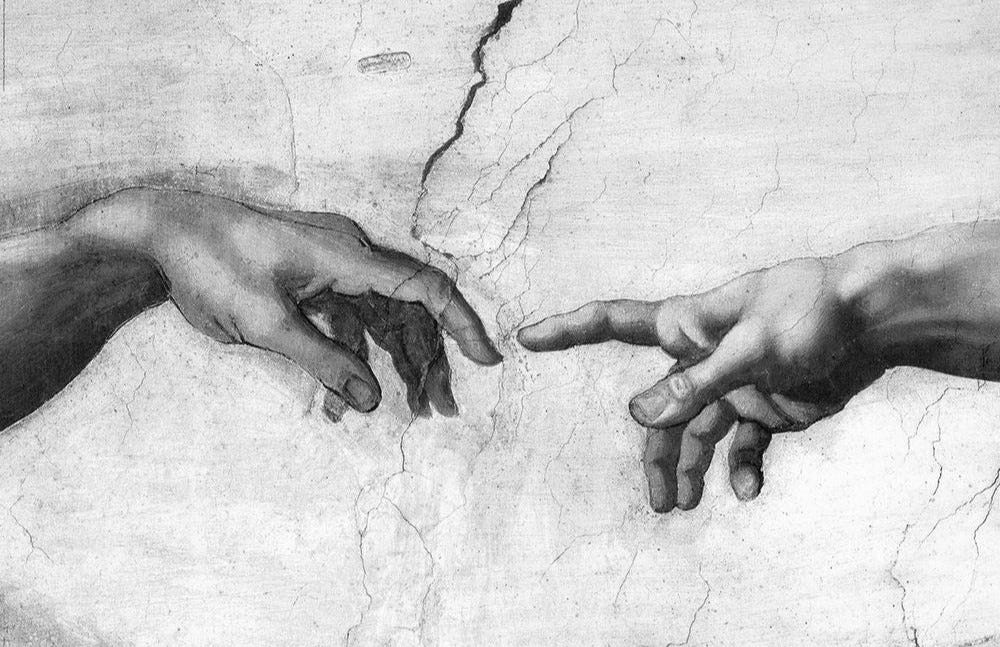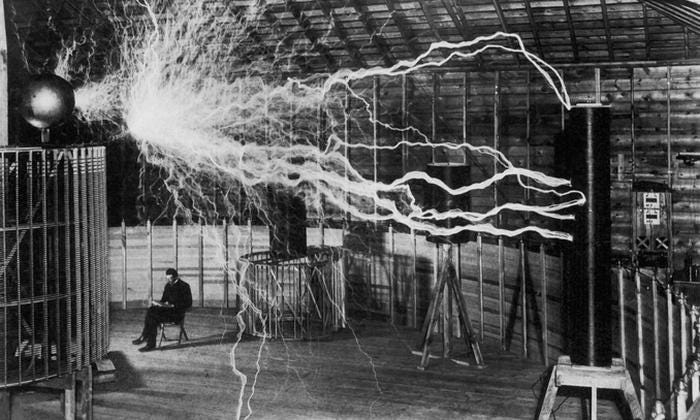2 | SOPHIAN⬥SCIRE : On the Nature of Knowledge
Method & Madness | Book I : Existential Fundamentals

The reason that many are so skeptical and dismissive when it comes to the subject of philosophy is because philosophers aren’t honest about their work. They pretend as though they discover their facts through a pure, peerless, transcendental rationality—that, as opposed to the method of the mystics (who are both more sincere and also more stupid, and so instead lay claim to “divine inspiration”). A philosopher’s “facts”, however, are fundamentally still opinions: theories and assumptions—their own kind of “inspiration”. Most often they’re nothing but a desire of the heart distilled into abstraction, which they then attempt to justify only after-the-fact.
—F. Nietzsche (ab. M. Hise)
Φιλο | filo: to loveΣοφία | sofia: wisdom
Philosophia is defined as “the love of wisdom”—as:
The cultivation of knowledge.
What this means is that philosophy is science—or perhaps, more accurately, that science is philosophy. After all, SCIENTIA is knowledge—and, one who engages in its cultivation is called “scientist”: someone who’s driven to seek the truth, and who’s motivated to think and learn in order to better-understand the nature of reality.
Μετα | meta: afterΦυσικά | physika: nature
Metaphysics: after nature (i.e. after natural-science, or physics)
Metaphysical knowledge can be referred to instead as theoretical—that is, after all, the intended meaning of the word. If, however, we would desire to speak in this way (that is, clearly, and to say that metaphysics = theory), then we must first acknowledge that metaphysical knowledge is necessarily knowledge which is created.
Theory is created; first-conceived-of in the mind of a thinker as hypothesis via premises formulated from data—data which must, in turn, have been sourced from a world which exists; either directly, as someone’s first-hand experience… or indirectly, as someone’s second-hand account of someone else’s direct, first-hand experience. In other words:
Meta-physics… follows-physics.
In our world, it is the case (by logical necessity) that any substantive theory on the nature of a world may only be formulated after an observation of that world has been made. To attempt, after all, to theorize before gathering any data from which to form premises… would be like a toddler trying to do addition before learning any numbers.
Metaphysics is derived from physics. Theory is derived from experience.
By its own, very simple definition:
Metaphysics is what comes after.1

A | a: fromPRIUS | prius: prior, earlier-times
a Priori: from before
a Priori knowledge is “theoretical knowledge which comes from before”—that is, from before observation. a Priori knowledge, therefore, can’t constitute substantive knowledge2 because it assumes the existence of innately-known data from which premises can then be formed—knowledge acquired via only intuition, independent of derivation from experience. In other words:
a Priori knowledge is theoretical knowledge which precedes all experience (and which, therefore, can’t possibly have been created in a way which makes sense).
a Priori knowledge can’t be assigned truth value—can be neither confirmed nor denied3—because its validity can’t be observed, and therefore can’t be assessed. Because its premises are impossible to test, it can only ever remain as assumption—never confirmed, because its claim to validity is un-witnessable. Therefore, because the truth value of a priori knowledge can’t logically be considered to be derived from experience, it should thus be impossible for it to possess any relationship to reality: to a physical, observable, experiential world.
In the words of Wittgenstein:
“The propositions of logic are tautologies (e.g. analytic propositions)4—and, therefore, they say nothing.”
And so, we can see that this form of “theory-from-before” can be considered neither coherent nor convincing (unless of course you are, once again, either deluded or insane). The only form of theory which we can call substantive is the form of “theory-from-after”—in other words:
Theory derived from experience.
Theory is knowledge which has been created—and thus, logically speaking, must’ve been created by someone. Substantive theory cannot be created in the absence of data… and the only data we can rationally consider to be substantively knowable is either our own, personal experience of the world (and its derivative theory)… or the information which has been reported to us as the experience of other people (and its derivative theory). Thus what Kant calls “a priori” is, in reality, non-priori… because it simply isn’t “theory-from-before”. What Kant calls “a priori” can, in reality, only occur in the position of “theory-from-after”—posterior to experience—because, while it may be prior to your experience, it cannot possibly be prior to all experience. The a priori is thus a form of knowledge which forgets its own history—the fact that all theoretical knowledge which can be used to form premises… is actually knowledge derived from prior experience.5
The right method of philosophy would be to say nothing except what can be said—that is, the propositions of natural science—and, whereof one cannot speak… thereof one must be silent.
—L. Wittgenstein (ab. M. Hise)
A theory is a story that’s told: a hypothesis detailing knowledge that’s presumed to be true—a narrative concerning a reality of the world derived from someone’s experience. This is why theory can only coherently exist as an empirical derivative—that is, because it’s knowledge that’s been derived from the collective experience of our forebearers.
History is a story—literally a story about things that happened before; events witnessed by people in the past, deemed important enough to commit to collective social memory.
Math is a story—a form of deep theory first-derived from the act of counting numbers: naming the grains held in the palm of a hand, or of cattle seen roaming the field.
Language is a story—a set of arbitrary movements of the tongue to which we assign specific meaning, and which we acquire only through experience.
Physics is a story—a story about the rules for the way the world works, based on what we’ve seen happen before in it.6
Religion is a story. Science is a story.7
Philosophy is a story—
A story about the world, and the way we relate to it.
A theory is a story… derived from our experience.
This argument is often disputed via the claim that “Physics” and “Metaphysics” are just names of two specific books compiled from lecture notes by the students of Aristotle after his death, and therefore don’t necessarily denote the order in which these disciplines were studied, nor do they represent their original thinker’s intention. To the single Aristotelian in the audience, I would ask: So do you think that it’s likely that Aristotle’s students were so stupid that they forgot what order topics would typically be taught in, and so decided to compile randomly… or is it just that the fact that “Physics” is filled with physics and “Metaphysics” is filled with metaphysics isn’t enough to convince you that the highly theoretical stuff in Book II can only really be discussed after learning the practically-verifiable stuff in Book I?
i.e. substantive data or substantive premises, and therefore substantive theory which stems from it.
As in Popper, wherein information which cannot be falsified cannot be considered substantive.
As in Kant, where “analytic propositions” are necessarily a priori. Tautologies are definitionally true statements—therefore, they don’t constitute substantive knowledge because they convey null information (that is, while removed from the empirical context which gives them definition). Take, for example, the following grunt-sequence “UG UG OG”, which I declare to be a tautology. Because it’s a tautology, it can’t be denied that this statement must technically be true—however, it also can’t be denied that it’s an absolutely useless series of noises… at least, for so long as it remains removed-from-context.
My claim isn’t that there’s no such thing as prior knowledge, but instead that all prior knowledge occurs posterior to experience. Prior knowledge, therefore, is not intuitive (i.e. a priori), but instead is derivative (i.e. a posteriori)—that is, derived from prior experience. Kant’s framework implies logic which yields 4 kinds of potential knowledge, 3 of which he accepts as coherent: [analytic/a priori], [synthetic/a priori], and [synthetic/a posteriori]. Kant then agrees to exclude the [analytic/a posteriori] as obviously incoherent. My claim is simply that “analytic” is itself a null category, and that all information which is considered a priori (both analytic and synthetic) is actually a form of either prior or posterior empirical knowledge—that is, respectively, either our own personal experience of the world… or derived from someone’s experience. The claim, obviously, isn’t that there’s no such thing as analysis—instead, it’s simply that all analysis (e.g. analytic philosophy) actually constitutes derivative theory.
Geometry is a story—and, in a Humean context, is a story told to us by Euclid.
Genetics is a story—almost literally blood-memory; the experiential adaptations of your ancestors, hard-coded into DNA: expressed in the very fiber of your being.












